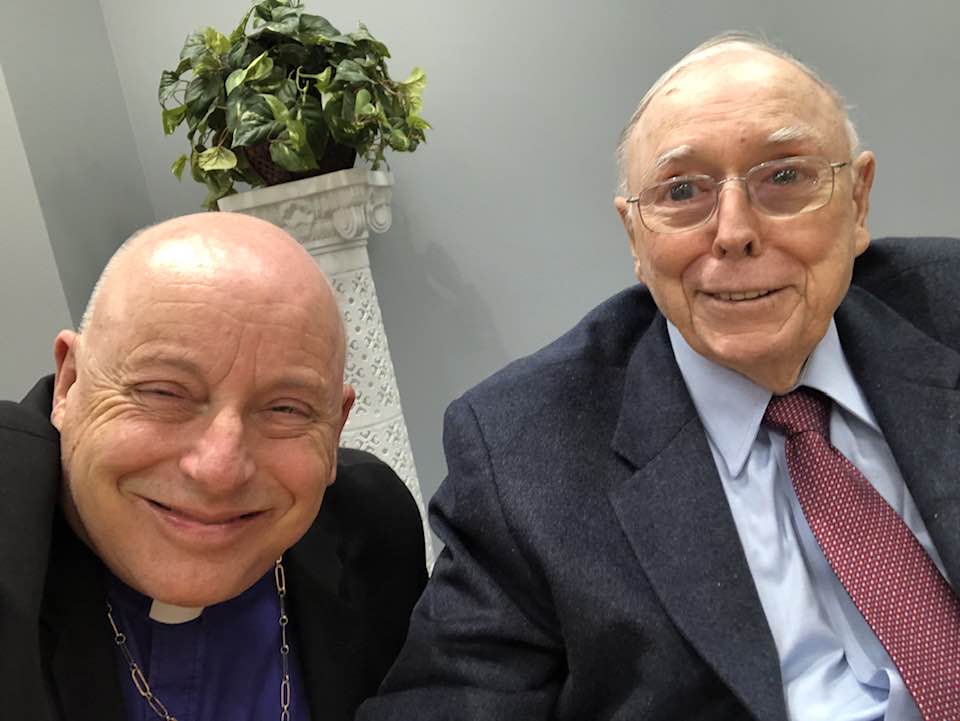 One of the nicest things anyone ever said to me was when Charlie Munger allowed that using church property to build housing for struggling commuter students wasn’t the dumbest idea he’d ever heard.
One of the nicest things anyone ever said to me was when Charlie Munger allowed that using church property to build housing for struggling commuter students wasn’t the dumbest idea he’d ever heard.
He was one of the smartest people on the planet, so I’m sure he’d heard a lot of dumb ideas in his nearly 100 earthly years, which ended today, according to an announcement from his family. But Charlie thought it was worth a shot. Thus did he encourage our campaign to build affordable housing on 25% of our mission and parish campuses in the Episcopal Diocese of Los Angeles.
I first met Charlie in the summer of 2017, when I began attending meetings of the Good Samaritan Hospital board of directors. Until the early sixties, the Episcopal bishop of Los Angeles was chair. Now, Charlie was, a volunteer service that cost him tens of millions of dollars of his own money because of the hospital’s perpetual cash crunch. But he loved Good Sam and so did all he could. As a member of the board, I watched in admiration tinged with sadness as he found safe harbor by negotiating our merger with PIH Health.
He chaired our meetings with boisterous good humor and elan, teasing me gently from time to time. He said that in his experience, bishops were sweet people, but naive. My friendships with former CEO Andrew Leeka, Charlie’s loyal friend, Episco-pal Mimi Grant, health expert and a fellow board member, and devoted former chaplain and PIH Health spiritual care director the Rev. Michael S. Bell deepened during those transition times. Michael is now spearheading our housing initiative.
After Charlie’s Good Sam years, we still served together on the Harvard Westlake board, where I always tried to get a seat next to his. Even at 99, he stayed for the whole meeting and had something important to add to each substantive conversation. With his 100th birthday coming up on New Year’s Day, the board had planned to honor him at its December meeting.
I called him at home periodically, sometimes to do some business, but mostly for the sheer joy of it. Once he was halfway through a new Lincoln biography and talked about it at length. He shared his views about investment management, architects, and China, whose vast innovative potential he said was being stunted by its repressive leaders. We talked a lot about politics.
While he was pessimistic about the long-term prospects of my second favorite vocation, print journalism, I could tell he relied heavily on good reporting. I asked how he would stay well informed if quality newspapers and magazines couldn’t afford to pay their correspondents. He said that if it was that important, they should be able to make it profitable again.
Speaking of a newspaper group that has figured out how to crack that nut, in February he participated in a bravura 150-minute Q&A at a Daily Journal Corporation shareholder meeting. Fully formed, publishable paragraphs rolled off his lips as he fortified himself with Diet Coke and See’s peanut brittle. One wag called this smart product placement. It was fun to learn that my high school journalism buddy David N. Schwartz and his spouse had interviewed Charlie for their new book about another of his favorite companies, Costco.
In response to a question at the “Daily Journal” forum, Charlie said that people in denial tend to make bad decisions. I called a day or two later to congratulate him and admitted that I could probably be accused of being in denial about the future of The Episcopal Church, since without it, I felt, U.S. Christianity stood a good chance of lapsing into heresy. So we were indispensable — surely an impractical notion in these secularizing times.
Charlie had his own views on faith and experience with the church. He also reckoned kindness as a virtue. He said, “I suppose there are worse things to be in denial about.” I’m taking that to the bank, too. Thank you, Charlie, for being one in a million, and Godspeed.
